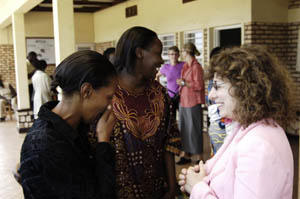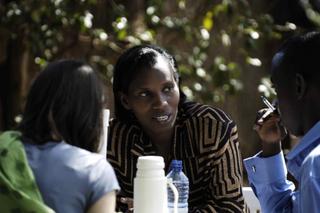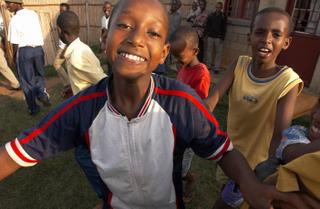Wednesday, September 07, 2005
Mission Accomplished!
Re-reading our own blog, the team is amazed at how much can be accomplished when a small group of business-minded people put their minds and hearts toward a goal. We have much to do coming out of the trip and a great deal to share with the many other Rwandan team members on September 28th. We look forward to presenting our report and working toward Rwanda's future together.
Our team in the above photo, left to right: Standing--Susan, Delilah, Maureen, Anne, Jita, Richard, Peter
Bottom row, seated--Cari, Geoffrey, Kate, Marla
Photo © Peter Lien 2005
Monday, September 05, 2005
SUNDAY: Last Day Before Heading Home
With our return back to Kigali once again we started a day with meetings, actually managing to get two more fast runner interviews in the schedule! Importantly, we had lunch with Felix of UNIFEM to map out the beginnings of our agreements. During a delicious barbeque (comped by the hotel thanks to some skillful negotiation by Delilah), we agreed that UNIFEM would host one-week business training for all the business leaders for each of the Rwanda Knits cooperatives. Bpeace will develop the curriculum and other fast runners will be able to attend as well. The training will be held at their Gitarma training center which will also host 40 Rwanda Knits machines
The afternoon was spent visiting two of the genocide memorials, at Ntarama and Nyamata. These memorials are around the country, maintained by survivors and are vivid remembrances of what occurred here.
In Kate's own words: "I went to Ntarama with Delilah, Maureen and Jita as well as with two Rwandans; Gilbert our driver and Geoffrey our guide and translator. After a long dusty ride through poor villages and miles and miles of barren land, we arrived at the site's front gate where we were greeted by its caretaker. My most vivid impression was how quiet this place now seemed. The only sound was the distant laughter of neighborhood children playing just outside and the occasional song bird.
It wasn't always so peaceful. Over three days 5000 people were murdered as they sought shelter in the little brick church and several out buildings on the grounds. Today Ntarama is cared for by an elderly man and his young assistant. As we stood in the church, the caretaker softly told us the story, which was his story too. His family was murdered in this place. He was one of 10 people who survived, and bears the physical and mental scars. It was a painful story to hear as we stood among the skulls of the victims in the ruins of this simple church. I wondered about the thoughts of Gilbert and Geoffrey and worried over their emotions.
The floor of one 10 by 12 room contains the ash where a small group were burned to death. Visitors walk in the midst of the ash. It is honored like all others as a burial place. The church has been left as it was after the horror of the three days. There are still bits of clothing, bones and piles of belongings through out the buildings. There is a ripped and stained poster of the last pope hanging on the wall. I looked up to the smashed church alter which sits under the jagged remains of a colored glass window and saw a leaning cross. I suspect many who visit here either feel mocked or comforted by the sight of the cross against this broken place of prayer.
Each of us had a deeply personal reaction to the sites we visited. Perhaps incredibly to some, I found Ntarama to be a place of peace despite the violent hatred and prejudice which created it. In the center of the grounds is a small stand of tall trees waving in the wind. They appeared as silent witness to what had happened here. Soon the trees will be joined by a memorial wall, a formal place of prayer and a garden.
The caretaker told us that he would forgive those murderers that asked him for it because he knew of no other answer. Forgiveness --- the greatest lesson toward a peaceful mankind is being taught by Rwandans all over the country. I will never forget their example or Ntarama. " Kate Buggeln
Our day ended with dinners at Aurea's and Joy's. Restorative evenings with wonderful food and socializing with new and old friends. Monday morning we will cram in some last meetings (and yes Kate is to go shopping again) and then begin our long journey home . . .
Sunday, September 04, 2005
SATURDAY: Brainstorming, Orphans, Shopping
After a great night's sleep and breakfast on the upper deck of the Kivu Sun hotel, another Intercontinental property and an immaculate hotel right on Lake Kivu, the group had it's first real brainstorming session (more to follow). The location was tempting us to remain, but it was time to head to Rose Carr's orphanage, Imbabazi.
We found Rose with the children at the orphanage with her 100+ kids of all ages and both genders. The girls are renowned for their crocheting skills and Caron International's donation of 2 suitcases worth of yarn was quickly distributed to the girls who rewarded us with Cheshire cat grins. Cari then sat among the girls on a couch outside and taught 4 of the girls how to crochet a flower square. They caught on quickly and were soon replicating the squares using the yarn they'd been given. One of the girls was so fast Cari should enter her into the "world's fastest crocheter" contest.
Rose is now 93 but still controls nearly every activity at Imbabazi, from who gets the yarn to which colors to give each girl. She is very well known in the US due to her book, A Thousand Hills, and about half of the kids have a sponsor in the US. None of the kids are allowed to be adopted, as Rose could not be sure of their treatment once they leave her care.
Cari said that "Seeing these girls who have so little being so happy with just a couple skeins of yarn and a crochet hook is somehow so gratifying, sharing a skill that crosses the ocean, cultures and generations, forming a bond that is difficult to describe."
It was then off for more shopping in Gisenyi, then the 3+-hour ride to Kigali. Dinner at Republica, a local bar/restaurant where many Rwandan business people, government officials and foreigners frequent, was very good. We met the owner and his sister, who runs the gift shop below the restaurant. This shop had the best presentation of merchandise and displays of all the shops we've visited. Of course Kate bought more stuff.
FRIDAY: Poverty but Not Hopelessness
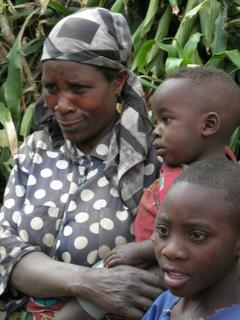 This day written by Cari in her own words: “Traveling from the luxury of the Kigali Intercontinental Hotel to the indescribably poor areas found in the
This day written by Cari in her own words: “Traveling from the luxury of the Kigali Intercontinental Hotel to the indescribably poor areas found in the 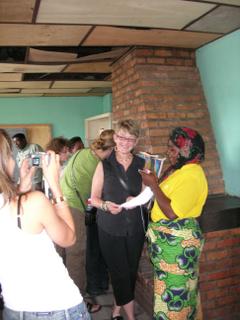
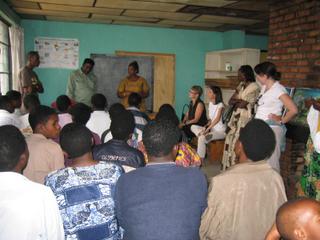
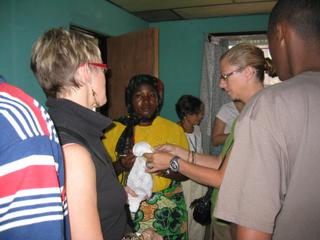
"Our first visit was to the young women of the Dian Fossey center. They had learned painting and were doing crochet projects for sale at the local market. The fact that it took a crocheter over a day to complete an item she could sell for just $1.00 did not seem to deter her. Once the cost of the yarn was deducted, the crocheter would net approximately $.65. These women should be able to make at least triple that figure when selling goods made on the machine and they are already thinking about sales and marketing strategies for their goods."

"After an exceptionally bumpy detour to see a bee-keeping project run by the Dian Fossey center, it was off to Gisenyi to meet with the AVEGA women. This group is part of the national association but runs its center independently. These women are of all ages and are in much worse financial condition than those at the other AVEGA locations - but their center is large and clean. These women had been waiting for us since
Friday, September 02, 2005
THURSDAY: School, Shopping and Agreements


Our day began as always with a breakfast planning session washed down with copious pots of coffee and African tea for our sleep deprived team. The tea is similar to chai and what many Rwandans drink. Both the coffee and tea are grown here in Rwanda. Have we already whined about the coffee situation? Much of the team is in full withdrawal from decent coffee as we continue to search for it here. But as we have shared earlier the search is fruitless as Rwandans export most of their wonderful product. Some of us gazed with longing at the coffee trees in Butare, many of which were in full bloom during our trip.
It is hard for the team to watch the coverage of New Orleans from so far away. Or perhaps it is easier? We, like you, remain dazed at the impact of the hurricane and the terrible downward spiral the region appears to be in. The third world has washed onto the Gulf shoreline. Indeed it appears worse. We listen to Kofi Annan call for international assistance for the U.S. from Africa and it is a surreal experience. We send our prayers and thoughts.
But back to work for us.
Anne and Kate go to school!
KIST is the Kigali Institute of Science and its campus is around the corner from the hotel. Founded in 1997 it is on the sprawling grounds of a former military center. Anne and Kate decided to walk and soon became lost on the grounds searching for their first appointment. They ended up on a self tour of the entire campus, entering building after building with Anne peering into classrooms and labs. The students were a bit stunned to see these two crazy ladies.
But the hot search was worth it as they left KIST with 2 agreements! The first was made with CP Agrawal and Maureen Wanziga who lead the ICT efforts at the institute. They have agreed to develop computer training program for Bpeace to be offered in Kigali and rural areas as needed. Importantly they offered to partner in any proposal for funding.
Our last stop at KIST was the Rwanda E-Documentation On-line Center (Write this URL down now Rwanda team: http://www.rwandainformation.org). This project is committed to put on-line ANY and ALL information about Rwanda. And best yet, if they don’t have the answer to your question, they will research it! We told the Director that Bpeace would become their best customer.
While Anne and Kate were attending classes, Cari and Delilah attended to two meetings at RIPA and IESC while Marla and Maureen conducted more fast runner interviews visiting some of the businesses. (We will have updates on these meetings soon as soon as possible)
While Marla completed the last of our fast runner interviews (bless her stamina) and Anne stayed at the hotel designing scarves (her artist skills are coming in handy!), the rest of the team went off to the markets with Kate showing them her favorite shops (where some of the shopkeepers already know her wellJ). Susan was our tour guide. Susan is another of our translators and has been valuable guide to us. We left every shop with local craft and learnings about available materials we can use in future product. Shops generally have much of the same imported low quality product, targeted to mzumga (foreigners), but you find high quality Rwandan gems in each, produced by local cooperatives.
Peter was once again mobbed by interested photo subjects on the streets of Kigali as he waited for the shoppers. By the end of the photo session he had photos of them and several of us were immortalized in the photo cameras of Rwandans.
At our last stop, a craft co-operative of about 15 shops, Delilah did some power shopping and Kate managed to purchase 7 pieces of antique African art! The rest of the team was more controlled but everyone left with something. One of the shops visited was a fast runner candidate who is producing Rwandan made fabric and jewelry.
Thursday, September 01, 2005
WEDNESDAY: Dancing as Fast as We Can
Cari, Delilah (having mostly recovered from her flu) and Geoffrey spent the morning at AVEGA discussing the felting process, knitting more samples for Cari to take back, initiating a project that involves as much crocheting as knitting and discussing projects Cari will leave with Geoffrey when she departs Rwanda. Then all the teachers donned their traditional Rwandan dress and posed for group photos (we will share photos tomorrow).


Marla, Maureen, Jita and Kate spent the day interviewing 30 fast runners, all members of AFER. We were wowed by these women who also invited us to lunch. Jita made a special connection, sharing her own story of survivorship during the Holocaust in our morning introductions. It was a poignant moment. It was also an intense day for the interviewers who called on reserves of stamina. As the day progressed and stories were shared, the Bpeace team was moved by accounts of loss and hope as well as impressed by their ambition to carve out a new future. Sounds so trite to type and yet is a truth lived everyday here. Anne and Delilah jumped in later in the afternoon so we could get through the interviews while the sun still shone. Once again a number of fast runner candidates were identified.
Meanwhile Cari and Geoffrey visited the Rwanda Women's Network office and proceeded into the hills surrounding Kigali to see their crafts training center which provides training for women who are victims of gender violence, both from the genocide and after. The visit ended with Cari meeting the future recipients of the 40 knitting machines and all of them dancing together doing traditional Rwandan dance.
This is the second day some lucky Bpeacers were welcomed with Rwandan dancing. Yesterday’s visit to AVVAIS began with a spirited welcome by the widows who are members of this organization .
Anne had a productive meeting with Peace Basemera, the Director of Commerce, and Justin Msengyuma, Secretary General of the Ministry of Commerce, during the morning. We have support from this ministry as they believe our “Fast Runner” approach is on target. The Secretary confirmed what we have been hearing from others --- coffee, tourism and crafts are key to Rwanda’s economic future. Next step: make Rwanda synonymous with quality products.
600 members. Their center has space for Cari’s knitting machines as well as electricity for ironing and finishing.
We use every moment here including the evenings. Elizabeth Powley from Women Waging Peace met the group for dinner at the hotel. Quick update from last night’s meetings…Marla and Anne talked with Gerald Mpyisi, formerly of AED and now head of Business Community Solutions, who is building telecenters in rural areas – internet cafes where the average Rwandan can access the world.
Wednesday, August 31, 2005
TUESDAY: Sweet and Savory
Weather in Kigali has been spectacular and this was one of the best so far. Bright sun, low humidity. Flowers are blooming on walls of wealthier compounds as well as in the yards of poor offices and homes. The evening air was so lovely that following dinner at Chez Robert some of the group decided to walk back to the hotel. It was a good walk after days of eating Rwandan food and no exercise but some of us bloggers are now regretting the later time! What were we thinking?
Some of our readers have asked about Rwandan food. It is quite good, a mixture of African tradition and French influence. Great sauces are a constant. The goat stew and savory “bananas” are excellent and the baked goods wonderful. This Sunday the group has been invited to the homes of two different Rwandans for an evening of traditional food. We cannot wait.
Tuesday was probably our busiest day to date. Meetings and knitting sessions brought a great deal of learning as well as special experiences for Bpeacers.
Marla , Ann, and Maureen began the day at Rwanda Private Sector Federation/On the Frontier, meeting with Doreen Kagarama and Info Communication Technology leader David Frenk (ICT is our version of IT). David wrote Rwanda’s 5 year technology plan for the government. Bpeacer’s goal was to learn about the future direction of the economic sector as we want to ensure we are future focused! This international consulting firm is working with the government to develop the product sector, in particular ICT. Another focus is ensuring that women are able to take their fair share of these emerging opportunities as new competitiveness is established. Coffee, tea, tourism and ICT were all discussed with a great deal of enthusiasm and a great deal of learning resulted.
Then the ladies headed to the Women’s Association of Entrepreneurs (AFER). The association will be a key resource for fast runners as it has over 1,000 members working in various fields. Indeed on Wednesday we will meet with 20 of them for fast runner interviews.
Cari and Kate spent the morning at USAID while Peter took photos of the local neighborhood. This was an important meeting as USAID was the source of the Rwanda Knits grant. The goal of the meeting was to provide them an update on the project and introduce Bpeace to their new Team Leader Ryan Washburn. And of course, open the doors to more funding for Rwanda Knits. Mission accomplished. Ryan asked many great questions and has little patience for the bureaucracy which saturates these projects. He made several suggestions regarding future funding and we have offered to steer him to information sources in the area of craft business development.
There was a mid-morning regrouping at Duttiembierre with Anne, Kate, Cari, Peter meeting with the head of this microfinancing organization. The organization, whose name means First Steps, was founded by New York women in the financial areas. We left with a potential source of funds for some of our knitting groups and connection to more significant money for our fast runners.
The US Embassy received Marla and Anne where they met with Cari McIntosh, Coordinator Ambassadors Special Self-Help Fund Democracy and Human Rights Fund
Relationship Development (These titles are quite something aren’t they?).
Bpeacers were cheered on by the embassy. Cari communicated that our strategy and approach was distinctive and spot on with the needs of the country. They are eager to help make the right connections for us and assist in our understanding of the complex political and NGO landscape.
Cari shared her perspective on emerging economic opportunities with tourism, ICT and coffee among the key areas. The group spent time discussing other agriculture opportunities in Rwanda (which include Anne’s favorite honey bees) and were made aware of another coffee cooperative, ADAR. We will follow-up.
One does not have to spend too much time in Rwanda to know that tourism could be a real industry here. The country is beautiful and has lakes, gorillas, mountains, lovely weather, great food and warm people. To make this happen there is a need for Rwanda branded product (impossible to find even a t-shirt here) and credit industry to emerge. Credit card acceptance remains quite limited.
Women for Women International was the next stop for Marla and Anne. Berra Kabarungi is the Country Director and identified a labor source for Cari’s knitters among their programs.
Kate continues to shop and the photo results to be posted when she has run out of money.

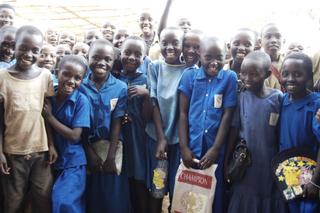
"Cari, Peter and I traveled to Nyamirambo today, a 30 minute journey to a town outside Kigali. Of course it would have taken only 15 minutes had there been more asphalt and fewer pot holes (seen Swiss cheese with fewer). We were headed to AVVAIS.
"The widows welcomed us with singing and dancing. It amazed me that women who had lost so much could sing with such joy. The Director, Chantal Kagemanyi gave us a quick tour of the new homes being built by teams of widows who lost their husbands during the genocide and those whose husbands are still in prison for committing acts of genocide. So much forgiveness in this country and so much to forgive.
"While Cari worked with the knitters inside, Peter and I made friends with the children outside. They almost broke my heart (maybe they did). No shoes, runny noses, torn clothing covered in dust . . .but show them their own image in the window of a digital camera . . .and you would think you just gave them the best present in the whole world. By the time school was out, word had spread that mazungus (foreigners) were in the neighborhood. I was soon surrounded. Everyone wanted their picture taken and to practice their English.
"Talk about a wake up call.. back home, in my NYC apartment, if I have no water and miss my morning hot shower, my day is ruined. These children and their mothers are hauling drinking water EVERYDAY without a thought for something as frivolous a hot shower. If we could help just one woman in Kigali earn a decent wage, how many of these children could benefit?"
--Maureen Spillane
Tuesday, August 30, 2005
MONDAY: A Day of Partners and Fast Runners
We had great meetings with both UNIFEM and AVEGA with loads of next steps for each. Anne, Cari, Kate and Delilah were Bpeace and Rwanda Knits representatives.
Then is was time for some quick creativity as Kate and Cari designed a new scarf incorporating the sun which shines on its flag and over Rwanda’s beautiful green hills. We hope this “Rwandan Hope Scarf” can be a significant fundraiser this fall season.
After our long day we welcomed a relaxing dinner with Joy Ndungutse and Janet Nkubana of Gahaya Links, two joyful talented Rwandan women who develop and export product made by rural Rwandan women. We spent an incredible few hours together filled with spirited conversation regarding their business and the programs of Bpeace and Rwanda Knits. Both Joy and Janet will be in the U.S. this fall and we look forward to more time together.
Sunday, August 28, 2005
SUNDAY-SATURDAY: 27 hours of air, ocean and airport dust later . . .

We arrived at Kigali and were met by friendly Rwandan faces: Rwanda Knits Program Manager Geoffrey Katushabe, who has become a new Bpeace friend and invaluable guide as well as Eric Rwabuhihi, Director of Rwanda and Americans in Partnership. And incredibly, fast runners were at the airport looking for us! Several friends of Bpeace joined the welcoming team and we look forward to interviewing them later this week! In the "old days" we had to go find them, now they find us!
3 hours later, after quick showers and a breakfast we were off. With a few dusty turns (with the first time visitors eyes wide open taking in the new sights), we arrived at the headquarters of Rwandan Women's Network. We did not know it then but it turned into a three hour impassioned meeting with over 20 women who gave up their Saturday chores to meet with us. We arrived bleary and weary but soon the energy and passion of the Rwandan attendees and their leader Mary Balikungeri not only blew us away but reinvigorated us. We started with introductions and ended with what looks like the potential for partnership. The women in their network are in fields diverse as construction, real estate, retail, beauty salons, software, and telecommunications. The heart of the meeting was a dialogue around business concepting and addressing the challenges of building businesses in
Rwanda. Additionally time was spent talking about the knitting project of which RWN will be a part and how to make this broadly and largely successful. We are excited to report that we will interview some of the women for our fast runner program and work with Mary on the next steps for molding our work together . . .we have high expectations given the success of the meeting.
Then wonderful sleep AND sleep AND sleep. Back up for 7am breakfast with the team and off . . .one car to Butare to meet with Tim Shilling, Director of the Pearl Project. The Partnership for Enhancing Agriculture in Rwanda through Linkages (PEARL) works with rural communities across Rwanda to generate income through agricultural product development and market linkages. Their program has transformed the Rwandan coffee industry (and was written up in Time Magazine this past week) and the other to Rwamagana's Avega Center to meet with 6 of the knitters in the Rwanda Knits Program.
Photo © Peter Lien 2005
Butare:

2 and ½ hours of road and scenery later Marla, Anne, Jita, Delilah, Kate and our guide Richard Niwanshuti arrived in Butare ready to talk coffee and did so and more. Did you ever hear of Rwandan chilies? Well surprise, 2 of Tim's cooperatives have been successful and Tim believes that with the right leader they can be developed into a robust domestic business (Rwandans currently import their chili sauce). During our tour of the Pearl offices and the Marabo washing station Tim gave us an amazing lesson in Rwandan coffee production as well as chili horticulture. Tim shared the need for business training among the farmers who know soil but not profit and loss. Our next steps: Tim and Bpeace to identify potential candidates to drive the chili business and Bpeace to connect with Avega (Monday) to assess their need and desire for Bpeace coffee farmer assistance.
Photo © Peter Lien 2005
Rwamagana:

Cari, Maureen and Peter traveled to the AVEGA center at Rwamagana, 40 minutes east of Kigali. AVEGA is an organization that works with widows of the 1994 genocide. The mayor was there to welcome us before we began our meeting with six of the twenty-five knitters who work out of this center. This industrious group used the manual knitting machines provided by CARON International to produce 400 sweaters that they sold to local schools and NGO's.
Maramba Coffee Washing Station
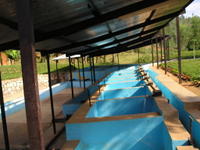
Rwandan's didn't like coffee being life long tea drinkers, until Maramba came to life. Tim and his team are working hard to create the next "Starbucks" offering free coffee to Rwandan early morning workers.
Photo © Peter Lien 2005
Rwamagana Knitters
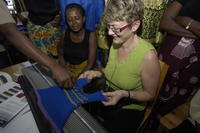
Bpeace member and FACED founder Cari Clement instructed the women in new techniques that will help them produce more sophisticated products that will hopefully allow them to earn more money for each item they produce. After a quick FANTA break and with the new cording machine that CARON provided, the design ideas started flowing, in particular headwear and sashes for the Rwandan dancers who perform at weddings. The women learned enough in two hours to keep them busy for weeks to come. The group knows they need to make their items unique so that they can earn more money and they want Bpeace to support them in that effort.
New friends
Did he capture the real me?
The final subject
Sunday, August 21, 2005
Rwanda Through a Photographer's Eye
This August, Peter is also part of the Bpeace mission team and we look forward to sharing more of his photos with you in the days to come.
Saturday, August 20, 2005
 Despite Rwanda's fertile ecosystem, food production often does not keep pace with population growth, requiring food imports. Photo © Peter Lien 2005
Despite Rwanda's fertile ecosystem, food production often does not keep pace with population growth, requiring food imports. Photo © Peter Lien 2005
Rwanda is the most densely populated country in Africa. Women have a life expectancy of only 48 years. Photo © Peter Lien 2005
Friday, August 19, 2005
 Rwanda has one the highest percentages of orphans in the world-- almost one out of five of the nation’s total child population. Photo © Peter Lien 2005
Rwanda has one the highest percentages of orphans in the world-- almost one out of five of the nation’s total child population. Photo © Peter Lien 2005 Gorillas like to spend their days at home with the family. They live in close-knit groups of five to 30 gorillas led by a patriarch. Photo © Peter Lien 2005
Gorillas like to spend their days at home with the family. They live in close-knit groups of five to 30 gorillas led by a patriarch. Photo © Peter Lien 2005 Even when they wander, gorillas rarely venture far - usually staying within a range of roughly 15 square miles in search of the shoots and berries they live on. Their only natural enemy are people. Human actions are placing gorillas in grave danger of becoming extinct. Conflict, poaching and logging are forcing gorillas off their land and threatening their survival. Photo © Peter Lien
Even when they wander, gorillas rarely venture far - usually staying within a range of roughly 15 square miles in search of the shoots and berries they live on. Their only natural enemy are people. Human actions are placing gorillas in grave danger of becoming extinct. Conflict, poaching and logging are forcing gorillas off their land and threatening their survival. Photo © Peter Lien 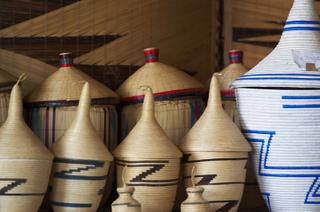 Bpeace first started working with Rwandans two years ago when our members helped make an international market for their "Peace Baskets." Today we are focusing on supporting businesswomen with more diversified products and services in order to help them build sustainable businesses, thus creating longer-term jobs for Rwandans. Photo © Peter Lien 2005
Bpeace first started working with Rwandans two years ago when our members helped make an international market for their "Peace Baskets." Today we are focusing on supporting businesswomen with more diversified products and services in order to help them build sustainable businesses, thus creating longer-term jobs for Rwandans. Photo © Peter Lien 2005 Cari Clement's successful knitting machine project has helped many Rwandan women learn new skills and earn income. Bpeace will now be partnering with Cari to assist some of the knitting co-ops evolve into sustainable businesses.
Cari Clement's successful knitting machine project has helped many Rwandan women learn new skills and earn income. Bpeace will now be partnering with Cari to assist some of the knitting co-ops evolve into sustainable businesses.Thursday, August 18, 2005
About Rwanda

In 1959, three years before independence from Belgium, the majority ethnic group, the Hutus, overthrew the ruling Tutsi king. Over the next several years, thousands of Tutsis were killed, and some 150,000 driven into exile in neighboring countries. The children of these exiles later formed a rebel group, the Rwandan Patriotic Front (RPF), and began a civil war in 1990 culminating in April 1994 in the genocide of roughly 800,000 Tutsis and moderate Hutus. The Tutsi rebels defeated the Hutu regime and ended the killing in July 1994.
Despite substantial international assistance and political reforms, the country continues to struggle to boost investment and agricultural output, and ethnic reconciliation is complicated by the real and perceived Tutsi political dominance. Kigali's increasing centralization and intolerance of dissent, the nagging Hutu extremist insurgency across the border, and Rwandan involvement in two wars in recent years in the neighboring Democratic Republic of the Congo continue to hinder Rwanda's efforts to escape its bloody legacy. (Source: The World Factbook)














